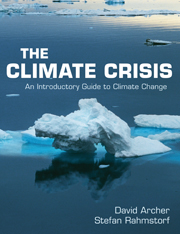Book contents
- Frontmatter
- Contents
- Preface
- 1 Retrospective: what we knew and when we knew it
- 2 Earth's energy budget
- 3 Climate change so far
- 4 Snow and ice
- 5 How the oceans are changing
- 6 The past is the key to the future
- 7 What the future holds
- 8 Impacts of climate change
- 9 Avoiding climate change
- 10 Climate policy
- Epilogue
- References
- Illustration credits
- Index
8 - Impacts of climate change
Published online by Cambridge University Press: 05 March 2013
- Frontmatter
- Contents
- Preface
- 1 Retrospective: what we knew and when we knew it
- 2 Earth's energy budget
- 3 Climate change so far
- 4 Snow and ice
- 5 How the oceans are changing
- 6 The past is the key to the future
- 7 What the future holds
- 8 Impacts of climate change
- 9 Avoiding climate change
- 10 Climate policy
- Epilogue
- References
- Illustration credits
- Index
Summary
In the previous chapter we saw how some physical characteristics of the climate system are expected to change – depending of course on how much more greenhouse gases we put into the atmosphere. In this chapter we will discuss how this will affect (and is already affecting) living things on Earth, including us. How will climate change affect plants and animals, ecosystems, and human society? This is a vast and complex topic studied by biologists, ecologists, geographers, social scientists, and many other specialists. The IPCC devotes an entire working group involving hundreds of scientists and the second volume of its assessment report to this issue. We summarize the most important findings in this chapter.
One important question is whether global warming is already having any noticeable effects, despite the thus far small amount of warming of 0.7 °C. Another question is to try and foresee the effects that global warming will have in the future, when it reaches three, four, five, or even more degrees. How serious will the impacts be? Who will be most vulnerable? To what extent can we adapt? How much will this cost?
It is obvious that effects on ecosystems and society are in most cases harder to predict than physical responses such as the melting of glaciers and sea level rise, so we must be aware that large uncertainties exist and surprises are likely. That consequences are hard to predict does not mean that they will be minor or harmless, though.
- Type
- Chapter
- Information
- The Climate CrisisAn Introductory Guide to Climate Change, pp. 151 - 190Publisher: Cambridge University PressPrint publication year: 2009



